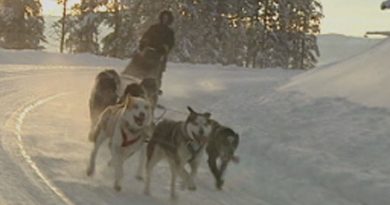Iditarod mushers pack fish, beef, stew and Twinkies for fuel
Paul Gebhardt has started the Iditarod Trail Sled Dog Race 19 times. He’s placed second twice and has learned a lot, including a snack tip: Twinkies never seem to freeze.
“Everyone says I’ll probably go green as I get older, but whatever,” he said, laughing as volunteers weighed bags filled with food and gear Wednesday that were dropped off by Iditarod mushers at an Anchorage warehouse.
The bags, packed with food and other supplies, will be flown to checkpoints along the trail in advance of the race. Each provides a little window into how mushers fuel themselves and their dogs during a 1,000-mile journey in temperatures that often dip far below freezing.
Beef, beaver & chicken for dogs
In his bags, Gebhardt tucked cream-filled Twinkies alongside frozen pulled pork sandwiches, breakfast burritos, orange juice and chocolate milk. For his sled dogs, he packed frozen beef, beaver, chicken and dry dog food.
Gebhardt said it’s key to pack food both you and your dogs really like, because “you kind of lose your appetite when you get so tired, because you’d sooner sleep then eat and same with the dogs.”
Jim Lanier, who has started the Iditarod 18 times, packed 2,126 pounds of food into two trucks for Wednesday’s drop-off. He said he started planning for his drop bags at the end of last year’s race — spooning dinner leftovers, like stew and spaghetti, into vacuum-sealed bags and freezing them.
“I eat pretty well, I think,” he said. He said one of his bags contains a curry rice dish labeled “Anna’s Delight,” after his wife, fellow musher Anna Bondarenko. For his dogs, he said he packed salmon and dry dog food.
Race food…customized
Mushers must pack bags for 18 of the race’s checkpoints — food is not shipped to Yentna or Finger Lake, and sending bags to Safety is optional, according to race rules. Each bag can weigh up to 50 pounds and mushers must pay 64 cents per pound, though their entry fee includes a $500 credit for bag drops.
Lanier wrote out a check Wednesday for $861.
Musher Ellen Halverson said she has her own recipe for race food. For a snack high in protein and fat, she said she melts butter, coconut oil, almond butter and peanut butter together. Then she adds a list of ingredients including vanilla, ground almonds, sunflower seeds and chocolate chips. She portions out blobs of the mixture onto wax paper and wraps them up.
“You can eat it frozen,” she said. “If it gets a little melted, it’s as tasty. There’s nothing in it that’s going to spoil. So I send some of that to every checkpoint.”
Halverson said she also sent bacon, taco chili, pot roast and sauteed broccoli. She strategically sent breakfast burritos to the checkpoints where she knows there are microwaves. She also sent clean underwear, gloves and socks. For her dogs, she packed beef, chicken, pork fat and dried dog food.
This is Halverson’s seventh Iditarod. She has finished twice, each time in last place, and dropped out four times. But Halverson, a single mom and psychiatrist, said she hopes this year the promise of good food keeps her going.
“I’m telling myself that I’m not going to go hungry. I’m not going to feel deprived,” she said. “So I just need to stay out there because there’s something good at the next checkpoint.”
Related stories from around the North:
Canada: Profile – Dog mushing in Inuvik, Canada, Eye on the Arctic
United States: How Iditarod checkpoints get their straw, Alaska Dispatch News



